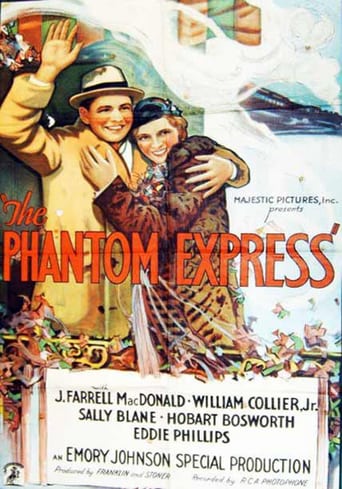lugonian
THE PHANTOM EXPRESS (Majestic, 1932), written and directed by Emory Johnson, has the makings of a weekly chaptered serial told in only 65 minutes, short enough for any viewer not to lose his train of thought. The title that indicates a supernatural theme, it comes close to that as terror rides the rails, terror being some sort of mysterious ghost train. With William Collier Jr. heading the cast, this feature presentation relatively belongs to the third billed J. Farrell MacDonald in one of his few on-screen opportunities to play the central character. Interestingly, MacDonald assumed the role as a railroad engineer the very same year as the release of THE PHANTOM EXPRESS, a chaptered serial titled THE HURRICANE EXPRESS (Mascot Studios) starring John Wayne and Shirley Grey. With similar titles, it's understandable to get these two movies confused.The story begins with D.J. "Smokey" Nolan (J. Farrell MacDonald), a veteran engineer of the Southern Pacific Railroad, running his locomotive "101" through the darkness of the night accompanied by his friend and partner, Axel (Axel Axelson). The signal lights tell him that the track is clear, but suddenly Smokey notices a headlight of another train directly ahead, forcing him to put the train into an immediate halt, pulling much of the attached railroad cars off its tracks. Following this incident, the headlight suddenly dims out. Accused of negligence, Smokey appears before John Harrington (Hobart Bosworth), the railroad president. Later, four more similar wrecks occur, Harrington finds himself pressured in selling out his railroad line, which causes Smokey dismissal from duty. In the meantime, Harrington's son, Bruce (William Collier Jr.), a pampered youth whose idea of responsibility is sleeping all day and dining with young ladies at night, surprises his serious-minded father by volunteering to investigate the mystery of the "Phantom Express" mainly for the purpose of becoming more acquainted with Smokey's attractive daughter, Carolyn (Sally Blane). Assuming the name of Bruce Smith and having his friend Dick Walsh (Eddie Phillips) pretending to be him by acting as railroad assistant, Bruce acquires the position as railroad mechanic, gets to room and board in the Nolan household and becomes better acquainted with Carolyn (sometimes addressed by Smokey as Caroline). During his investigation, Bruce realizes he's on the right track as he stumbles upon an amazing discovery.The supporting players includes David Rollins as Jack Nolan, Smokey's younger son; Claire McDowell as Mrs. Nolan; Lina Basquette (star of Cecil B. DeMille's THE GODLESS GIRL in 1929) briefly appearing as Collier's temperamental girlfriend, Betty; Tom Wilson as James Callahan, and Jack Pennick, C. Huntley Gordon, among others. Axel Axelson, who performs his task in typical Swedish fashion, accent and all, gives a performance that echoes the likes of the more familiar John Qualen, who might have assumed the part in that fashion had he been cast. The second billed Sally Blane (Loretta Young's sister), has little to do in this mystery, but performs well in what she is given as Collier's love interest and kidnap victim.A poverty-row mystery with a neat ending twist, THE PHANTOM EXPRESS is surprisingly good in theme and action, however, occasionally comes off a little weak with some of its typical 1930s dialog and somewhat laughable staged fist fights between hero and villain. Aside from these minor faults, it's most notable scene occurs midway as Smokey (MacDonald) returns home to be surprised by a birthday party from his family (hundreds of candles on the cake and miniature train on track circling around the table), and unable to tell the bad news of his dismissal. Shortly after leaving the event, Smokey finds himself alone in his bedroom to grief and glaring at an old picture frame as he cries and laughs at the same time, causing him to throw and break the frame as it crashes onto the floor. All this is underscored with the use of violins. Quite original and effective.After many years of obscurity with limited reissues, THE PHANTOM EXPRESS, became one of many public domain titles distributed onto video cassette in the 1980s, as well as getting some exposure during the after midnight hours on various TV channels during its early years of cable television, appearing on such networks as Christian Broadcast Network, Tempo and Channel America, before disappearing from the airwaves. A movie like THE PHANTOM EXPRESS might not be worthy of 15 academy award nominations, but is an interesting look back at the sort of programmers produced by independent film studios during the bygone 1930s, and something of interest mainly for its concept, if nothing else. All Aboard!!!!! (**)
ecberman
Without a doubt, The Phantom Express (1932) is my all-time favorite early talkie, railroad-themed movie. J.Farrel McDonald is outstanding as Smokey Nolan, the long-time engineer. I've seen a few other movies where McDonald plays a railroad-related part (e.g., with Victor McLaglen in The Broadway Limited) and it would appear that McDonald probably worked for the railroads prior to becoming a very good character actor as he played his parts with a great deal of ease and apparent intimate knowledge of the subject matter. Phantom Express was also very interesting from the standpoint that it was shot in live action, in/around LA and the Southern Pacific Railroad (including real shots of the SP boardroom at the old Central Station at 5th and Alameda), the SP Alhambra Roundhouse, Burbank Tower, etc. Also, the special effects modelling scenes were very much ahead of their time in terms of realism. All together, an excellent film of which I own several copies.


